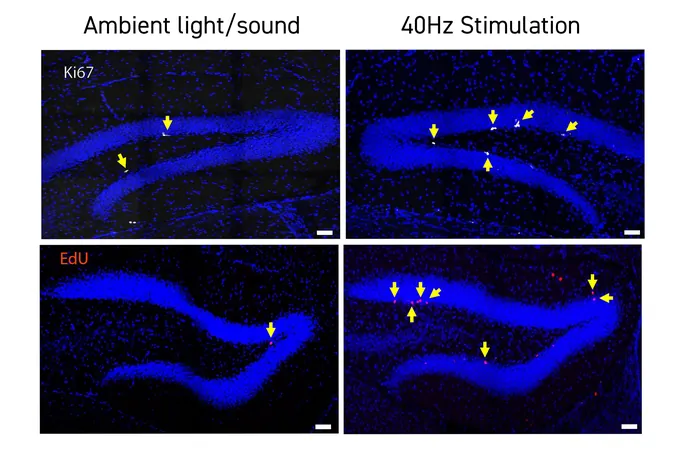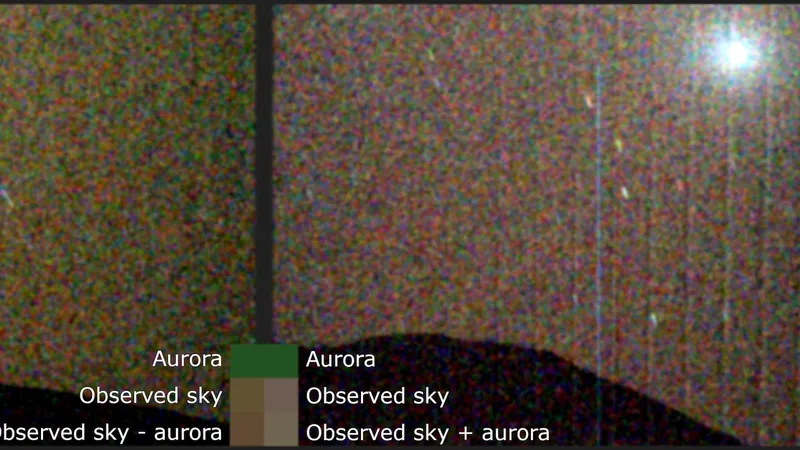
Breakthrough Discovery: 40Hz Light and Sound Stimulate Cognitive Growth in Down Syndrome Mice
2025-04-25
Author: Nur
Groundbreaking Research at MIT
A team of scientists from The Picower Institute for Learning and Memory and the Alana Down Syndrome Center at MIT has made a remarkable discovery: exposing mice engineered to model Down syndrome to light and sound at a frequency of 40Hz enhances cognition, promotes neurogenesis, and strengthens brain connectivity.
The Power of 40Hz Stimulation
Leading the study, Professor Li-Huei Tsai highlights the promising implications of this research, known as GENUS (Gamma Entrainment Using Sensory Stimulation). However, she emphasizes the need for further research to determine its potential clinical benefits for humans with Down syndrome, mentioning that a small-scale human study is currently underway.
Encouraging Results from Mouse Models
Utilizing the Ts65Dn mouse model, which mimics several characteristics of Down syndrome, the researchers conducted experiments where mice were subjected to one hour of 40Hz stimulation daily over three weeks. The results were compelling, with significant improvements observed in short-term memory tests related to spatial navigation and recognition.
Neuroscience Unveiled: Synaptic Growth and Gene Expression
The study delved into the brain's hippocampus, revealing heightened neural activity in stimulated mice. The research team utilized advanced techniques, including single-cell RNA sequencing, to identify significant changes in gene expression. Notably, they discovered that genes associated with the formation of synapses were notably more active in stimulated mice.
A Glimpse into Neurogenesis
In a pivotal finding, the researchers noted an increase in the expression of TCF4, a critical gene for neurogenesis, in mice that underwent GENUS stimulation. This suggests that the growth of new neurons in the dentate gyrus could explain the observed improvements in memory function.
Cognitive Resilience Against Alzheimer's
The implications of this research extend beyond Down syndrome. With about 90% of individuals with Down syndrome developing Alzheimer's disease after age 40, the study offers hope. The stimulation retained higher levels of Reelin-producing neurons in the hippocampus, which are crucial for cognitive resilience in Alzheimer's pathology.
What's Next for GENUS Research?
Despite these groundbreaking findings, the researchers caution that the model used is not a perfect reflection of human Down syndrome, and the cognitive tests focused solely on short-term memory. Future studies could further explore the broader implications of GENUS on other crucial brain regions.
The Future of Cognitive Health
As excitement builds around the potential of GENUS, this study stands as a beacon of hope for innovative therapies targeting cognitive health in Down syndrome and other conditions. With ongoing research, the team aims to unlock new avenues for therapy that could revolutionize care for those affected by cognitive impairments.




 Brasil (PT)
Brasil (PT)
 Canada (EN)
Canada (EN)
 Chile (ES)
Chile (ES)
 Česko (CS)
Česko (CS)
 대한민국 (KO)
대한민국 (KO)
 España (ES)
España (ES)
 France (FR)
France (FR)
 Hong Kong (EN)
Hong Kong (EN)
 Italia (IT)
Italia (IT)
 日本 (JA)
日本 (JA)
 Magyarország (HU)
Magyarország (HU)
 Norge (NO)
Norge (NO)
 Polska (PL)
Polska (PL)
 Schweiz (DE)
Schweiz (DE)
 Singapore (EN)
Singapore (EN)
 Sverige (SV)
Sverige (SV)
 Suomi (FI)
Suomi (FI)
 Türkiye (TR)
Türkiye (TR)
 الإمارات العربية المتحدة (AR)
الإمارات العربية المتحدة (AR)